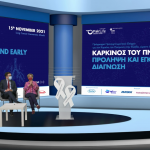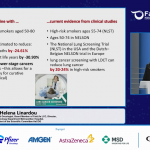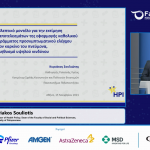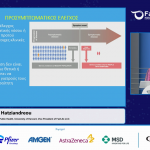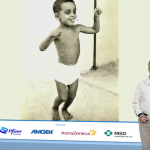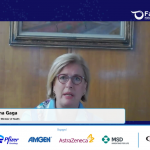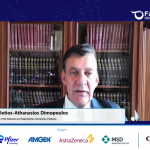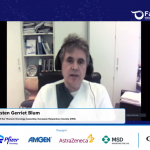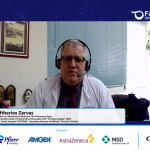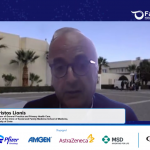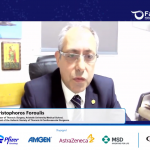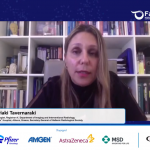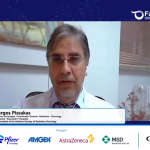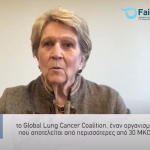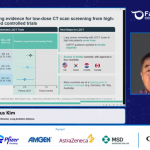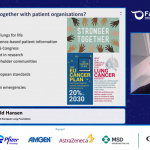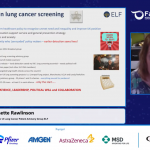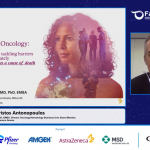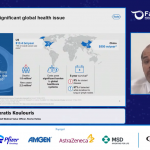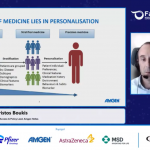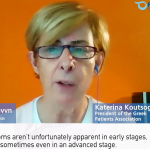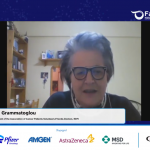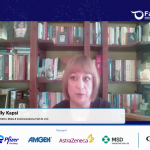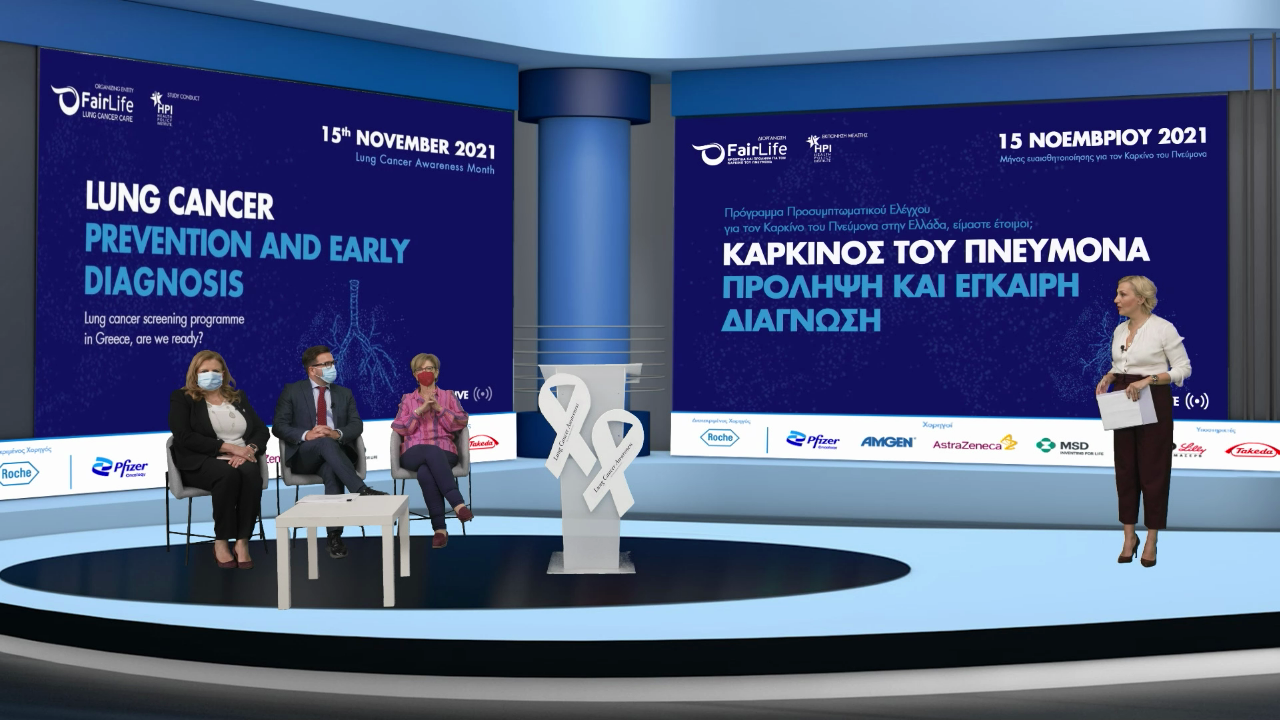
Lung Cancer:
25% mortality reduction by Screening Implementation
FairLife LCC’s online conference: «Lung Cancer – prevention and early diagnosis: Lung Cancer Screening Programme in Greece, are we ready? »
The findings and data analysis of a study, conducted for the first time in Greece, documented the clear benefits of lung cancer screening with low-dose CT scan to the health system and society. Screening leads to early diagnosis, early and better treatment options and increase in lifespan. The conjuncture of the presence of the Deputy Minister, Mrs. Mina Gaga, pulmonologist and familiar with the issue, the consensus of all parties and of course the study findings in Greece, confirmed by corresponding international studies, undoubtedly requires the inclusion of lung cancer screening in the national program for prevention “Spyros Doxiadis”.
The study was conducted by the Health Policy Institute, under the scientific supervision of Mr. Kyriakos Souliotis, Professor of Health Policy, Dean of the Faculty of Social and Political Sciences, University of Peloponnese and Dr. Evi Hatziandreou, Public Health Expert and Vice President of FairLife LCC.
Based on a predictive, stochastic model, presented by Kyriakos Souliotis, screening leads to a significant reduction in deaths by 24.61% and a reduction in years of life lost by 30.9%.Specifically, the model predicts 339 fewer deaths and 944 fewer years of life lost per 100,000 within five years. The above figures are in line with similar studies in other countries, as pointed out by the professor.
Dr.Evi Hatziandreou, Public Health Expert, University of Harvard and Vice President of FairLife LCC, pointed out that expenditure on preventive care in the EU accounted for 2.8% of total health expenditure – a very small percentage, less than the value spent on the system’s administration. Following the presentation of the study results, lung cancer screening meets all the criteria, set by International Organisations and Health Systems for the adoption of Programmes for specific diseases. She, however, stressed the need for proper and integrated planning and implementation, so as to maximize the benefits. Especially in our country, where lung cancer is the leading cause of cancer death, accounting for more deaths than breast, colorectal and prostate cancers combined, and for 9,000 new cases every year, screening will be a powerful weapon in the battle of secondary prevention.
As Mrs. Elena Linardou, Medical Oncologist, Board Member of FairLife LCC, Director of the 4th Oncology Department, Metropolitan Hospital and President of the Scientific Committee HeCOG , pointed out, the survival rate for lung cancer is 9 out of 10, if early diagnosed. However, if the diagnosis is delayed (stage IV), the survival rate drops to 1 out of 10. According to Mrs. Linardou, data on the benefits of screening are now undeniable and our main concern should lie in how to implement the model. She added that a 38% drop in death rates is expected from the integration of smoking reduction interventions in screening programmes. Mrs. Linardou also proposed the foundation of special lung cancer centers, which should include smoking cessation clinics.
At the beginning of the conference, FairLife LCC, the first social organization in Greece, exclusively dedicated to lung cancer, presented its extensive actions, implemented in just one year, within the context of informing the State authorities and raising public awareness, regarding the importance of prevention and early diagnosis in lung cancer treatment. The President of FairLife LCC and member of the Board of Directors of the European patient association LuCE, Mrs. Korina Pateli-Bell, referred to the foundation of FairLife and its objectives, thanked all participants and reminded the audience that only 16% of lung cancer cases are diagnosed at the early stages of the disease. Emphasizing on early detection, she stated: “Don’t wait! Get checked! Anyone with lungs can get Lung Cancer”.
The event was addressed by:
Deputy Minister of Health Mrs. Mina Gaga, who underlined the importance of early diagnosis, as we have a large number of smokers in Greece and lung cancer is the leading cause of death. The Minister noted that it is highly important for our country to have a coordinated programme with specific criteria for information and early diagnosis, involving all interested parties, so that it can be included in the National Programme “Spyros Doxiadis”. Working to the development of such a programme, the Ministry collaborates with EOPYY, the Hellenic Thoracic Society and patients’ representatives.
Meletios- Athanasios Dimopoulos, Professor of Hematology-Oncology and Rector of the National and Kapodistrian University of Athens, who noted that smoking rates have declined in recent years, however not as significantly as in other countries and stressed the need for cooperation and mobilization, in order to promote information about prevention and early diagnosis. Professor Dimopoulos pointed out the need to use “tools” for the optimal operation of a treatment programme, such as the adoption of reimbursement criteria for the test, the greater diffusion of the diagnostic algorithm through laboratories’ optimization, the reinforcement of the treatment algorithm by examining two prognostic indicators and the reinforcement of treatment protocols, as there are now advanced therapies.
Dr. HeatherWakelee, President of the International Association for the Study of Lung Cancer (IASLC) and Professor of Oncology at Stanford University Medical Center,who mentioned that lung cancer has been the invisible cancer, therefore we use a clear or white ribbon for lung cancer awareness, to represent air in the lungs. It is the number 1 cancer killer of men and women in the US and most of Europe, however it is often not highlighted for many reasons, particularly to avoid stigma.
Ewelina Szmytke, Vice President of Lung Cancer Europe (LuCE), who referred to the European lung cancer awareness campaign “Get Checked”. Lung cancer patient groups join together in a “Get Checked” call for screening, encouraging those who have symptoms, related to lung cancer, to get checked without delay. She thanked FairLife LCC for promoting the “Get Checked – Anyone with lungs can get Lung Cancer” campaign in Greece.
In a special moment of the conference, Tsimaras Tzanatos, director, actor and poet, shared a personal story and vividly recounted his health adventure, emphasizing the crucial CT scan examination, which led to lung cancer early detection and successful treatment. Mr. Tzanatos concluded his life story, “Unknown the Violence of Life”, thanking the audience from the bottom of his “lungs”.
Scientific Community discussion:
Dr. Torsten Gerriet Blum, Member of the Executive Committee of the European Respiratory Society (ERS) stated that the European Respiratory Society works to promote screening in the EU, by providing comprehensive data. Prevention and accurate diagnosis will help reduce mortality from lung cancer, the leading cause of cancer-related deaths in many European countries.
Mrs.Zenia Saridaki, Medical Oncologist, President of the Hellenic Society of Medical Oncology, stressed the need to set strategic goals such as reducing tobacco use to 5% of the population by 2040, early information about smoking health risks, etc., while highlighting the huge importance of clinical and translational research in finding innovative treatments that will allow for a world free of lung cancer.
Mr. Eleftherios Zervas, Secretary General of the Hellenic Thoracic Society stated that screening can contribute to lung cancer early diagnosis and thus to its effective treatment. Responsible information and cooperation of all interested parties are essential, so as to integrate lung cancer screening into the national strategic health development plan.
Mr. Christos Lionis, Professor of General Practice and Primary Health Care, School of Medicine, University of Crete, pointed out the lack of central coordination of all institutions and the gap between words and actions, regarding prevention. He proposed a specific framework for cooperation, and he stressed the need to train health professionals in primary health care to develop personalized interventions to achieve behaviour change, focusing mainly on education in risk perception and early recognition of symptoms.
Mr.Christophoros Foroulis, Professor of Thoracic Surgery, Aristotle University Medical School, President of the Hellenic Society of Thoracic & Cardiovascular Surgeons, put priorities on discouraging new smokers and on creating screening algorithms alongside information to convince smokers of the importance of early diagnosis with low-dose chest CT scans, as in this case (stage I), complete cure rates exceed 80%.
Mrs. Kyriaki Tavernaraki, Radiologist, Registrar Α’, Department of Imaging and Interventional Radiology, «Sotiria» Hospital, Athens, Greece, Secretary General of Hellenic Radiological Society, pointed out that there is sufficient available equipment (CT scanners) in public and private health structures to implement chest CT screening with a special low-dose protocol. This can be undertaken by radiologists and in cooperation with other specialties, in order to achieve optimal benefit for examinees.
Mr. Giorgos Pissakas, Vice President of the Hellenic Society of Radiation Oncology, sent a strong message of prevention and early diagnosis, regarding lung cancer, the number 1 cancer killer. He added that, if detected early, we can achieve very high cure rates with a minimum of treatments.
Discussion of Patients Communities Associations:
Carolyn “Bo” Aldige, Vice President of Global Lung Cancer Coalition(GLCC) reported that lung cancer has been transformed from a rare disease to the leading cause of cancer incidence, accounting for 18% of cancers worldwide with 1,8 million deaths. She also presented the operation of the Prevent Cancer Foundation and articulated the vision of a world, where no one dies of lung cancer.
Caius Kim, Global Director, Lung Ambition Alliance (LAA) presented data from various international studies, demonstrating the dramatic increase of survival rates and the cost-effectiveness of early diagnosis. He also pointed out that time should no longer be wasted, because many lives can be saved.
Kjeld Hansen, Chair of European Lung Foundation and Janette Rawlinson, Member of Patient Advisory Group ELF, shared their experience from the institution’s activities.
Mrs. Katerina Koutsogianni, President of the Greek Patients Association agreed with the need for screening and wished for a faster implementation of the programme.
Mrs. Kaiti Apostolidou, President of the Hellenic Cancer Federation (ELL.O.K), Board Member of ECPC- European Cancer Coalition, expressed ELL.O.K. ‘s full support for screening, but stressed that an integrated approach – which includes prevention, early diagnosis, treatment and reintegration – is necessary, while stressing the necessity to implement all measures provided by the European Code Against Cancer. She also noted the need for the reimbursement of biomarkers and the reinforcement of pathologists, to avoid delays in diagnoses, due to lack of specialists.
Mrs. Zoi Grammatoglou, President of the Association of Cancer Patients, Volunteers, Friends, Doctors KEFI focused on the need for cooperation with public hospitals for the implementation of the screening programme. However, as there are no trained health professionals and as the mentality of screening does not exist in Greek society, it is the responsibility of the state, first to train health professionals and then to convince and at the same time inform the general public.
Representatives of pharmaceutical industries referred to new available and under development treatment options, their patient-centered approach and their will to support the implementation of a lung cancer screening programme. Views were expressed by Mr. Christos Antonopoulos, MD, PhD, and EMBA, Director of Oncology / Hematology Business Unit, AstraZeneca Greece, Mr. Sokratis Koulouris, MD, Chief Medical Value Officer, Roche Hellas and Mr. Christos Boukis, Value, Access & Policy Lead, Amgen Hellas.
The event was held under the auspices of the Hellenic Association of Pharmaceutical Companies (S.F.Ε.Ε) and of the following scientific companies: Hellenic Thoracic Society (HTS), Hellenic Society of Medical Oncology (HESMO), Hellenic Association of Lung Cancer (HeALC), Hellenic Society of Thoracic and Cardiovascular Surgeons (HCTSS), Hellenic Radiological Society (HELRAD.), Hellenic Society of Radiation Oncology (HESRO), Hellenic Foundation for Cancer Research (H.F.C.R.), European Respiratory Society (ERS). Also, of patients’ associations: Hellenic Cancer Federation (ΕLL.Ο.Κ), Greek Patients Association, Association of Cancer Patients, Volunteers, Friends, Doctors (Κ.Ε.F.Ι), European Lung Foundation (ΕLF), Global Lung Cancer Coalition (GLCC), International Association for the Study of Lung Cancer (IASLC), Lung Cancer Europe (LuCE), και Lung Ambition Alliance (LAA).
The Conference has been presented and coordinated by journalist Elena Papadimitriou. The section of scientific bodies and patients’ representatives has been coordinated by journalist Nelly Kapsi, Communication manager of FairLife LCC.
The event was supported by the companies: Roche Hellas (distinguished sponsor), Pfizer Hellas, Amgen Hellas, AstraZeneca Greece, MSD (sponsors), PHARMASERVE-LILLY S.A.C.I., Takeda (supporters).
- Έλενα Λινάρδου, Παθολόγος Ογκολόγος, Mέλος Δ.Σ. FairLife LCC και Δ/ντρια Δ΄ Ογκολογικής Κλινικής, Νοσοκομείο Metropolitan, Πρόεδρος Επιστημονικής Επιτροπής EΣΟΟ
- Κυριάκος Σουλιώτης, Καθηγητής Πολιτικής Υγείας και Κοσμήτορας της Σχολής Κοινωνικών και Πολιτικών Επιστημών του Πανεπιστημίου Πελοποννήσου
- Εύη Χατζηανδρέου, Δρ. Δημόσιας Υγείας Παν/μιο Harvard, Αντιπρόεδρος FairLife LCC
- Κορίνα Πατέλη Bell , Πρόεδρος FairLife LCC
- Τσιμάρας Τζανάτος,σκηνοθέτης, ηθοποιός και ποιητής
- Αναπληρώτρια Υπουργός Υγείας, Μίνα Γκάγκα
- Πρύτανης ΕΚΠΑ, Kαθηγητής Αιματολογίας-Ογκολογίας, Αθανάσιος Μελέτιος Δημόπουλος
- Torsten Gerriet Blum, Επικεφαλής Ομάδας Ογκολογίας Θώρακος Ευρωπαϊκής Πνευμονολογικής Εταιρείας (ERS)
- Ελευθέριος Ζέρβας Γενικός Γραμματέας ΕΠΕ
- Χρήστος Λιονής, Καθηγητής Γενικής Ιατρικής και Πρωτοβάθμιας Φροντίδας Υγείας, Τμήμα Ιατρικής, Πανεπιστήμιο Κρήτης
- Χριστόφορος Φορούλης, Καθηγητής Καρδιοθωρακοχειρουργικής, ΑΠΘ Πρόεδρος Ελληνικής Εταιρείας Χειρουργών Θώρακος – Καρδίας – Αγγείων
- Κυριακή Ταβερναράκη, Ακτινολόγος, Επιμ. Α’ Τμήμα Ιατρικής Απεικόνισης και Επεμβατικής Ακτινολογίας ΓΝΝΘΑ «Η Σωτηρία», Γ.Γ. Ελληνικής Ακτινολογικής Εταιρείας
- Γιώργιος Πισσάκας, Αντιπρόεδρος της Ελληνικής Εταιρείας Ακτινοθεραπευτικής Ογκολογίας
- Ζένια Σαριδάκη, Ιατρός Παθολόγος-Ογκολόγος, Πρόεδρος ΕΟΠΕ
- Carolyn “Bo” Aldige, Αντιπρόεδρος του Global Lung Cancer Coalition (GLCC)
- Caius Kim, Global Director, Lung Ambition Alliance (LAA)
- Kjeld Hansen, Chair of European Lung Foundation
- Janette Rawlinson, Member of Patient Advisory Group ELF
- Χρήστος Αντωνόπουλος, MD, PhD, EMBA, Διευθυντής Τμήματος Ογκολογίας / Αιματολογίας, Μέλος ΔΣ, AstraZeneca Ελλάδας
- Σωκράτης Κουλούρης, MD, Chief Medical Value Officer, Roche Hellas
- Χρήστος Μπούκης, Value, Access & Policy Lead, Amgen Hellas.
- Κατερίνα Κουτσογιάννη, Πρόεδρος Ένωσης Ασθενών Ελλάδος
- Καίτη Αποστολίδου, Πρόεδρος ΕΛΛ.Ο.Κ, Mέλος Δ.Σ. ΕCPC – European Cancer Patient Coalition
- Ζωή Γραμματόγλου Πρόεδρος Συλλόγου Καρκινοπαθών, Εθελοντών, Φίλων και Ιατρών Αθηνών Κ.Ε.Φ.Ι.
- Νέλλη Καψή, υπεύθυνη Media και Επικοινωνία FairLife LCC
- Έλενα Παπαδημητρίου, δημοσιογράφος
For more information:
Communication Manager, FairLife L.C.C.:
Nelly Kapsi
Napoleontos 18, 16675, Glyfada
Tel: 213 0165784
Email: nellykapsi@yahoo.com
Facebook: https://www.facebook.com/fairlifelcc
Website: https://fairlifelcc.com/
YouTube
LinkedIn
Athens, 17/11/2021
